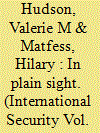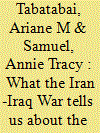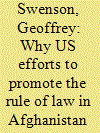|
|
|
Sort Order |
|
|
|
Items / Page
|
|
|
|
|
|
|
| Srl | Item |
| 1 |
ID:
153632


|
|
|
|
|
| Summary/Abstract |
Debates over how governments can defeat insurgencies ebb and flow with international events, becoming particularly contentious when the United States encounters problems in its efforts to support a counterinsurgent government. Often the United States confronts these problems as a zero-sum game in which the government and the insurgents compete for popular support and cooperation. The U.S. prescription for success has had two main elements: to support liberalizing, democratizing reforms to reduce popular grievances; and to pursue a military strategy that carefully targets insurgents while avoiding harming civilians. An analysis of contemporaneous documents and interviews with participants in three cases held up as models of the governance approach—Malaya, Dhofar, and El Salvador—shows that counterinsurgency success is the result of a violent process of state building in which elites contest for power, popular interests matter little, and the government benefits from uses of force against civilians.
|
|
|
|
|
|
|
|
|
|
|
|
|
|
|
|
| 2 |
ID:
153630


|
|
|
|
|
| Summary/Abstract |
Approximately seventy-five percent of the world's population lives in countries where asset exchange upon marriage is obligatory. Rising brideprice—money or gifts provided to a woman's family by the groom and his family as part of marriage arrangements—is a common if overlooked catalyst of violent conflict. In patrilineal (and some matrilineal) societies where brideprice is practiced, a man's social status is directly connected to his marital status. Brideprice acts as a flat tax that is prone to sudden and swift increases. As a result, rising brideprice can create serious marriage market distortions that prevent young men, especially those who are poor or otherwise marginalized, from marrying. This phenomenon is especially evident in polygamous societies, where wealthy men can afford more than one bride. These distortions incentivize extra-legal asset accumulation, whether through ad hoc raiding or organized violence. In such situations, rebel and terror groups may offer to pay brideprice—or even provide brides—to recruit new members. Descriptive case studies of Boko Haram in Nigeria and various armed groups in South Sudan demonstrate these linkages, while an examination of Saudi Arabia's cap on brideprice and its efforts to arrange low-cost mass weddings illustrates the ways in which governments can intervene in marriage markets to help prevent brideprice-related instability. The trajectory of brideprice is an important but neglected early indicator of societal instability and violent conflict, underscoring that the situation and security of women tangibly affect national security.
|
|
|
|
|
|
|
|
|
|
|
|
|
|
|
|
| 3 |
ID:
153631


|
|
|
|
|
| Summary/Abstract |
Numerous polls demonstrate that U.S. public approval of President Harry Truman's decision to drop the atomic bombs on Hiroshima and Nagasaki has declined significantly since 1945. Many scholars and political figures argue that this decline constitutes compelling evidence of the emergence of a “nuclear taboo” or that the principle of noncombatant immunity has become a deeply held norm. An original survey experiment, recreating the situation that the United States faced in 1945 using a hypothetical U.S. war with Iran today, provides little support for the nuclear taboo thesis. In addition, it suggests that the U.S. public's support for the principle of noncombatant immunity is shallow and easily overcome by the pressures of war. When considering the use of nuclear weapons, the majority of Americans prioritize protecting U.S. troops and achieving American war aims, even when doing so would result in the deliberate killing of millions of foreign noncombatants. A number of individual-level traits—Republican Party identification, older age, and approval of the death penalty for convicted murderers—significantly increase support for using nuclear weapons against Iran. Women are no less willing (and, in some scenarios, more willing) than men to support nuclear weapons use. These findings highlight the limited extent to which the U.S. public has accepted the principles of just war doctrine and suggest that public opinion is unlikely to be a serious constraint on any president contemplating the use of nuclear weapons in the crucible of war.
|
|
|
|
|
|
|
|
|
|
|
|
|
|
|
|
| 4 |
ID:
153633


|
|
|
|
|
| Summary/Abstract |
The 1980–88 Iran-Iraq War stands as the pivotal event for Iran's national security strategy, especially as it pertains to the country's controversial nuclear program. The “imposed war,” as it is known to Iranians, caused Iran to view itself as isolated and on the defensive, striving for self-reliance and survival in what it continues to perceive as an unjust international order. The war has shaped both Iran's strategic outlook generally and its nuclear policies specifically. It was a decisive factor in determining the nature and scope of Iran's nuclear activities, as well as in Iran's approach to the international negotiations surrounding those activities, which in 2015 produced the Joint Comprehensive Plan of Action. Both during those talks and after the implementation of the deal began, Iranian decisionmakers regularly invoked the history and lessons of the war to construe their decisionmaking process and define their bottom lines. Yet the war and its implications for Iran's strategic culture and nuclear thinking remain understudied and misunderstood. If the implementation of the deal and a longer-term resolution of the conflict over Iran's nuclear program are to succeed, the history of the Iran-Iraq War and the vital lessons that Iran has drawn from it must be appreciated.
|
|
|
|
|
|
|
|
|
|
|
|
|
|
|
|
| 5 |
ID:
153634


|
|
|
|
|
| Summary/Abstract |
Promoting the rule of law in Afghanistan has been a major U.S. foreign policy objective since the collapse of the Taliban regime in late 2001. Policymakers invested heavily in building a modern democratic state bound by the rule of law as a means to consolidate a liberal post-conflict order. Eventually, justice-sector support also became a cornerstone of counterinsurgency efforts against the reconstituted Taliban. Yet a systematic analysis of the major U.S.-backed initiatives from 2004 to 2014 finds that assistance was consistently based on dubious assumptions and questionable strategic choices. These programs failed to advance the rule of law even as spending increased dramatically during President Barack Obama's administration. Aid helped enable rent seeking and a culture of impunity among Afghan state officials. Despite widespread claims to the contrary, rule-of-law initiatives did not bolster counterinsurgency efforts. The U.S. experience in Afghanistan highlights that effective rule-of-law aid cannot be merely technocratic. To have a reasonable prospect of success, rule-of-law promotion efforts must engage with the local foundations of legitimate legal order, which are often rooted in nonstate authority, and enjoy the support of credible domestic partners, including high-level state officials.
|
|
|
|
|
|
|
|
|
|
|
|
|
|
|
|
|
|
|
|
|